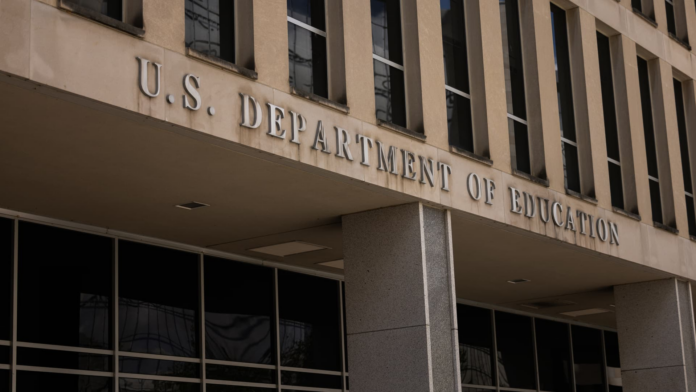President Donald Trump is taking steps to eliminate the Department of Education.
Since Trump returned to office there have been major cuts to the department’s budget, namely $600 million from teacher training programs and $226 million in grants for the Comprehensive Centers Program, which provides trainings and resources for schools and educational agencies.
Additionally, his administration has begun rolling back policies aimed at promoting diversity, equality and inclusion principles, such as instructing schools to cease considering race in admissions decisions and rescinding a Title IX guidance that encouraged equal pay for male and female athletes receiving name, image and likeness payments.
Trump and his administration have also reportedly begun drafting an executive order to terminate the Department of Education, but it has not been released or signed yet.
If the department is eliminated or rendered obsolete through de-funding and downsizing personnel, the more than 42 million federal student loan borrowers who currently owe a debt to ED could find themselves in administrative turmoil.
First and foremost, even if the department is eliminated, borrowers who owe money on their federal student loans would be expected to continue paying back that debt, says Abby Shafroth, co-director of advocacy and director of the student borrower assistance program at the National Consumer Law Center.
Here, Shafroth shares what the near future could look like for current college students and federal student loan borrowers.
CNBC Make It: Can President Trump eliminate the Department of Education?
He can neither shut down the Department of Education — which was created by Congress, and would have to be eliminated by Congress — nor can he move the Federal Student Aid program to some other entity without Congress. Congress specifically and solely authorizes the Department of Education to manage the federal student loan program.
How could the current administration otherwise accomplish the goal of minimizing federal involvement in education?
Short of immediately eliminating the department, we will see similar things to what has been happening with USAID (United States Agency for International Development) and to the CFPB (Consumer Financial Protection Bureau) in terms of shuttering much of its operations by defunding much of the operations, putting staff on administrative leave, or issuing stop-work orders by canceling existing contracts that are needed for operations, and potentially engaging in large-scale layoffs as well as hiring freezes.
How might current and incoming college students feel the impact of those kinds of cuts at ED?
Those students could face, at best, disruptions like mistakes or delays in terms of accessing the student aid that they need to stay enrolled.
The Federal Student Aid Program is huge, and it’s a complicated program, and there’s a history of mistakes even in good times. But if you are taking away the resources and the people with knowledge and expertise to to run these programs, I would fully expect mistakes, delays, errors. And there’s a big question in my mind about access to information for student borrowers.
We’ve seen with other agencies that information is being removed from websites, information that the public relies upon. So there’s a risk of the Department of Education either going out and aggressively removing information on websites that students need to understand their federal aid and financial aid options and what they need to do to renew, or just not updating as things change, which is also bad.
It’s been floated that the Department of the Treasury would take over federal student loans if ED is dismantled. What could that potentially look like?
It might not make an immediate difference, but it’s going to make a difference over time if the person tasked with setting the rules for the student loan program is the Secretary of Education — whose job is just to ensure access to education and excellence in education — versus if the person tasked with setting the rules for the program is the Treasury Secretary, who’s tasked with collecting taxes and overseeing federal revenues.
What are the risks of transitioning from the federal government managing student loans back to a reliance on private lenders?
When we’re talking about entirely getting the federal government out of lending programs, the concern there is that leaves students and families entirely up to the whims of private lenders.
And particularly when you’re talking about students who haven’t yet entered the labor market, they don’t have credit scores, they don’t have jobs, often there’s no way for banks and lenders to determine how credit-worthy they are, other than, often, their parents’ income or their family wealth.
Will student borrowers still have recourse through FSA if they wind up defrauded by their school or if their school closes?
There’s a team of folks at ED that help oversee the schools that are participating in the FSA program, and they’re looking out for signs of fraud or financial insolvency by schools.
If they get stop-work orders or they get defunded, then we’re going to see an increase in scammy schools that are preying on students for their student aid programs while delivering useless degrees or abruptly closing, leaving students with no degree.
This interview has been edited and condensed for clarity.
Want to earn some extra money on the side? Take CNBC’s new online course How to Start a Side Hustle to learn tips to get started and strategies for success from top side hustle experts. Pre-register now and use coupon code EARLYBIRD for an introductory discount of 30% off $97 (+taxes and fees) through April 1, 2025.
Plus, sign up for CNBC Make It’s newsletter to get tips and tricks for success at work, with money and in life.
What happens to student loans if Department of Education is eliminated
RELATED ARTICLES




